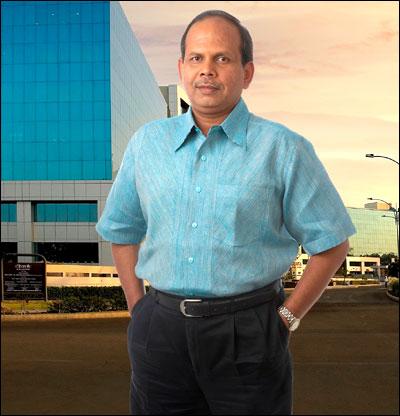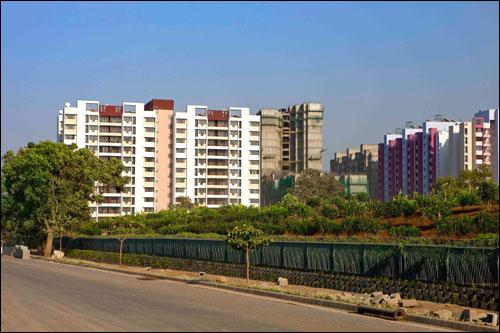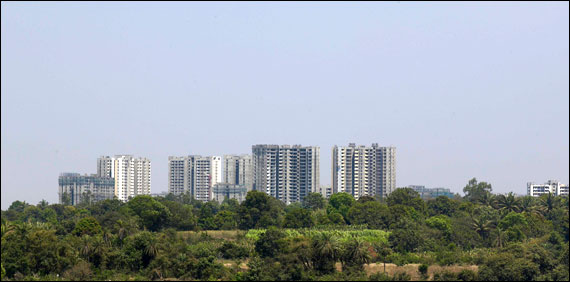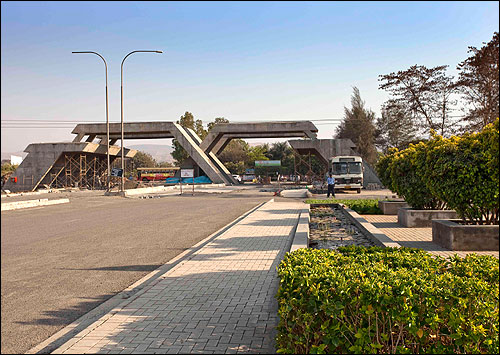 | « Back to article | Print this article |
'Liberalisation has to come into the real estate industry'
He united his entire band of Magars and formed India's first farmers' corporate town development company. Magarpatta city, created by Satish Magar, has become a benchmark in city development. The greenery, the cleanliness, orderliness in this city is the envy of every builder in the country.
Currently the president of the Maharashtra Builder's Association, Magar is busy rewriting his Magarpatta success. This time, it's a bigger planned city. Nanded City developed by the Nanded Town Development Corporation) of which Magarpatta Town Development is a partner), is a Rs 6,000 crore project spanning a whopping 700 acres.
Excerpts of an exclusive interview with rediff.com A Ganesh Nadar.
Where exactly is this Nanded city coming up?
It is about 7 kms from Swargate, Pune.
In which year was construction started?
We started in 2010 and we have also given possession to a few people.
When will it be complete?
It will take ten years for the entire project to be completed. The earnest amount booking started in 2008. We confirmed the earnest amount people in 2010 when construction started.
Why did you settle for this particular land?
We wanted to do something in the western part of the city. We wanted to do it in the format we always do - where farmers are part of the development where they become shareholders instead of just sellers of land.
Here the farmers of the area came to us and they were ready to work on the same format as Magarpatta. So it's the second city on the same model.
Have you got all the necessary environment clearance?
We cannot start construction without that. Yes, we have all necessary clearances.
Click on NEXT for more...
'Govt should allow 100% FDI in real estate'
There is demand from genuine buyers. There is no demand from investors in Pune. It was never there in cities like Pune. Even if it's there it's on a very small level.
What are the major trends in your field now?
The cost of construction is very high. Labour costs are high and not available. It's the major stumbling block for the entire industry. Technology has improved but that is also costly.
Should the government allow FDI in real estate?
They should. Only then will we get capital at reasonable rate of interest. Now the banks charge us very high rates. We are the second largest employer after farming and still we do not get funds at a reasonable rate.
The government is concerned about Delhi and Mumbai and doesn't realise that the rest of India is also a happening place. Just because there is dual pricing in these two cities doesn't mean we all do it. Here we accept only cheque payment. Banks are wary of black money in buying and selling of houses, but this is not the case in the rest of the country.
Then they also look at the big four in the construction field. It cannot happen this way. They have to look at the whole picture. They should look at those who provide homes for the needy and not for the super rich. In Pune and elsewhere it is a very clear cut system.
They should allow 100% FDI in the real estate business and then we will get cheap funds.
But banks do lend money to house buyers?
Yes. They do but they never give project finance. And if they do give project finance they will not give money to buy the land. Why can't they give money to buy land? Then they give you money for construction at a high rate of interest.
Are banks ready to fund major infrastructure projects like this?
No. they are very fussy and it takes very long to get funding. We get bank funds because we have a good project but that is not the case for others.Click on NEXT for more...
'It's important to rationalise stamp duty'
How real are real estate prices in India?
It is the FSI and law that increases the price. In certain areas because of the location the rates are very high. In general the government rules, regulations and taxes are keeping prices high.
Then labour is very expensive. There are machines to do most of the work including walls. But the cost is even higher than what it comes with labour. Thus investment costs become higher.
Then the government comes out with schemes like NREGA and labourers don't want to come to work for us.
How does your company stand apart?
Maintenance of the already complete property is what sets us apart. We continue to maintain our property even after we sell it. Other builders sell and leave. We stay and maintain and thus our buyers are very happy. The results are there for all to see. If we did not maintain it, it would have become a slum by now.
Mumbai is out of reach for most buyers that is why the real estate sector in Pune is booming.
Do you think stamp duty should be rationalised to global standards?
The stamp duties are very high. In the nineties the liquor and tobacco industry used to bear the brunt of all taxes. Now the real estate industry is bearing the brunt. The government forgets that we support the second largest labour force in the country.
There are 100 allied industries that are running because of real estate developers. It is adding to the GDP of the country and nobody seems to be aware of that. We are creating assets. It is very important to rationalise the stamp duty to international standards where they are 2% to 3% and here it is more than 12%.
Click on NEXT for more...
'We cannot follow rules that are 40 years old'
What steps should the government take to improve the real estate sector?
Liberalisation has to come into this industry. They have to re look their rules and regulations. They have to see how fast we are progressing. We cannot follow rules that are 40 years old. A law might have been very good in 1962 but today it is out dated. It is not of any use now.
We have to see how the whole world is developing. They have to get new technology. There has to be fresh blood in the system. There should be a lot of private participation in the planning process.
They have to take our views because we have the exposure and the experience.
You say you are the second largest provider of employment but your labour is un-organised?
The government has started organizing them. It is now mandatory for the builders to now put money in provident fund for the employees. We are putting in one percent but the government must also contribute its share which it is not doing.


